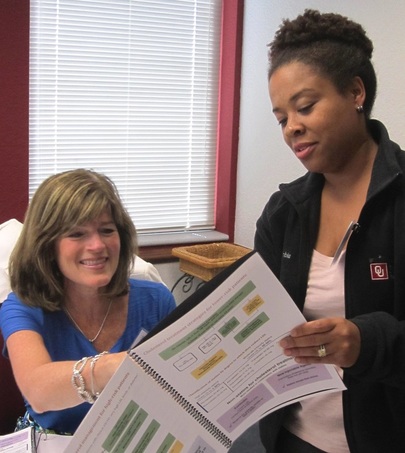 Behind the Scenes with Dr. Doyle-Tadduni, NaRCAD Training Facilitator Editor’s note: In this series, DETAILS asks Academic Detailing (AD) Techniques Training facilitators how they lead by example, challenge participants, and ensure that trainees are ready to go out into the field. Dr. Doyle-Tadduni focused on her insights and tips to success in providing excellent clinical education by building strong detailer-to-clinician relationships based on evidence, clarity, and “intrinsic trust.” Tags: Cardiovascular Health, Detailing Visits, Expert Trainer Insight Series, Training NaRCAD: Hi, Mary Liz! We’re looking forward to learning more from you about what it’s like to train prospective academic detailers. But first, tell us a little about how you became involved in detailing. Dr. Doyle-Tadduni: I began working as an academic detailer about 10 years ago in Pennsylvania with the Independent Drug Information Service, which is sponsored by PACE (Pharmaceutical Assistance Contract for the Elderly). My clinical background in nursing and my teaching background within various university settings has served me well in this role as a clinical educator. NaRCAD: What does a day of academic detailing look like for you? What successes and challenges do you see? Dr. Doyle-Tadduni: My territory encompasses the westerns suburbs of Philadelphia where I visit physicians, nurse practitioners, and physician assistants. I see these providers in a variety of settings, including private practices, university-affiliated practices, and outpatient health care systems. Since AD is a new concept to many practitioners, it’s essential to start your visit by educating providers about the importance of academic detailing and how it will benefit them and their patients. In this way, I’ve developed many long-standing relationships with providers who have said that AD has been very beneficial for their individual practices. It’s very gratifying in a follow-up appointment to hear that a provider has taken the evidence you provided and put it into practice, creating a positive outcome for patients. NaRCAD: How do you build strong relationships with the clinicians you visit? Dr. Doyle-Tadduni: There needs to be an intrinsic sense of trust between a detailer and the provider. You may not gain the trust in the relationship during your initial visits, but when you provide clinicians with a full understanding of the importance of your visit, along with presenting educational materials that are credible and evidence-based, you promote trust and strengthen the relationship and gain clinician commitment to changing behavior for the better. NaRCAD: You’ve facilitated quite a few trainings with us at NaRCAD. Tell us more about the course, and why you enjoy doing it. Dr. Doyle-Tadduni: This course is a great support for both new and seasoned trainees in enhancing their detailing skills, as well as program managers who oversee a clinical education program and need a greater understanding of how best to run an effective program. At the beginning of the training, the trainees absorb AD theoretical content and techniques, and on Day 2, they’re actively practicing the techniques and role playing different educational encounters in small groups. The program trainees have been wonderful people to meet! I’ve had the opportunity to meet people from all over the United States, and some from Australia, Portugal, and Europe. It’s been very interesting being involved with the trainings and hearing about health care in other regions of the US and abroad. Despite the miles that separate all of us in our different demographics, we all have similar challenges in our respective health care systems. NaRCAD: As a trainer, you “play” the role of the clinicians during breakout group sessions, presenting different personalities as well as various behavioral and content-based objections to the material or the visit. Tell us more about this part of the course. Mary Liz practices with a trainee, teaching the importance of showcasing AD as a service that will create better outcomes for clinicians’ practices and patients. Dr. Doyle-Tadduni: We present the trainees with many different role play scenarios where they can actively practice overcoming obstacles that get in the way of earning clinician commitment. Finding the right delivery of your messaging can be very challenging, depending on the environment, and every detailer will have a unique set of potential obstacles to face at each visit. The key is to focus on the evidence, so that practitioners can realize how beneficial it will be to their practice. The training’s small group role play practice sessions provides trainees ample opportunity to practice, ask questions, perfect their skills, and be prepared to face inevitable obstacles in their own future visits. NaRCAD: What do NaRCAD trainees need to have to be ready to succeed as a detailer? How does our 2-day training help to get them ready for success? Dr. Doyle-Tadduni: The trainees need to have an expert knowledge base of the clinical topic and related materials they’ll be presenting during a visit. They also need to present AD as an on-going resource. With busy practitioners being so tightly scheduled through the day, programs designed to assist them in improving how their practice runs is a plus. By the end of the two days of training, the trainees will have a strong foundation of clinical education techniques, and they’ll be forming ideas about implementing these efforts in their respective programs. NaRCAD: Any closing thoughts or advice for new trainees, or first time detailers as they prepare to head into the field? As long as you’re well-versed on the material you’re delivering, and you’re presenting yourself as an “ambassador of the evidence”, you’ll have the tools you need to ensure that an academic detailing visit is truly successful. Comments are closed.
|
Highlighting Best PracticesWe highlight what's working in clinical education through interviews, features, event recaps, and guest blogs, offering clinical educators the chance to share successes and lessons learned from around the country & beyond. Search Archives
|
